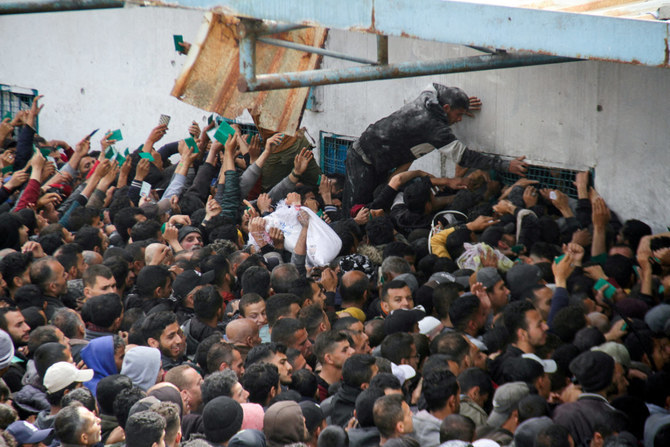UNITED NATIONS: International aid groups said on Thursday there is nothing more they can do to protect staff in the Gaza Strip and that it is up to Israel to avoid killing them as the United Nations appealed for direct humanitarian coordination with the Israeli military.
Global outrage at the humanitarian crisis in the Palestinian enclave of 2.3 million people escalated after an Israeli airstrike on Monday killed seven people working for US-based food charity World Central Kitchen.
The UN says at least 196 humanitarian workers have now been killed in the six-month-long war as Israel retaliates against Hamas in Gaza over a deadly Oct. 7 attack on Israel by the Palestinian militant group.
While some aid groups have suspended operations following the strike on the World Central Kitchen convoy on Monday, none have said they plan to withdraw from Gaza despite the repeated attacks on aid operations in Gaza. The United Nations warns a famine is imminent.
The UN has long complained of obstacles to getting aid in and distributing it throughout Gaza.
“Every day we are forced to decide whether to suspend an operation or to proceed with an operation — and often the decision is to suspend because we don’t have the proper security conditions in place,” Scott Paul, associate director for peace and security at Oxfam America, told reporters.
The UN and international aid groups operating in Gaza said they share the locations of all premises and planned movements with the Israeli authorities and are in daily contact. The United States said on Tuesday that it was “unacceptable and inexplicable” that the Israeli military’s procedures to avoid harming aid workers were not functioning appropriately.
“One of the things that would probably improve the system ... is for us to have the ability to have more direct contact with the military as opposed to going through a number of layers of military-civilian coordination as it does now,” UN spokesman Stephane Dujarric said on Thursday.
Israel’s Defense Ministry said on Tuesday that it would work to strengthen coordination, including by opening a joint situation room to coordinate between the Israeli military’s southern command and international aid organizations.
Israel also said on Thursday it would adjust war tactics.
“The rules of war require that those fighting always know the difference between military targets and humanitarian relief workers,” said Bushra Khalidi, an Oxfam policy adviser.
“If there’s any ever any doubt, it’s on Israel to avoid harming us,” she said, adding that aid groups make their staff as visible as possible in an effort to protect them.
Celebrity chef Jose Andres, who founded World Central Kitchen, told Reuters that Israel had targeted his aid workers “systematically, car by car.” Israeli government spokesperson Raquela Karamson responded on Thursday: “This was unintended.”
Louise Bichet, head of the Middle East department for Doctors of the World/Médecins du Monde, said her organization’s offices in Gaza City had been partly destroyed “even though we had clearly communicated our GPS coordinates and it was very well known by the Israeli army.”
“This shows the failure of the deconfliction process and poses a serious question ... (about) the understanding and respect of IHL (international humanitarian law) by the state of Israel,” she said.
The UN Palestinian refugee agency UNRWA — described by UN Secretary-General Antonio Guterres as the backbone of the humanitarian response in Gaza — said there has been more than 300 strikes on its facilities and 177 staff had been killed.
UNRWA said it had shared the coordinates of all of its facilities in Gaza with all parties to the conflict. Several aid convoys to northern Gaza had also been targeted despite detailed coordination with the Israeli military, UNRWA said.
Isabelle Defourny, president of Doctors Without Borders/Médecins Sans Frontieres (MSF) France, said the humanitarian coordination system was not working and that she could not imagine how it could be improved when there was a “lack of proportionality” in how Israel was conducting the war.
“They know where we are, what we do, where we will work,” she said. “Despite that ... there are security incidents.”


























